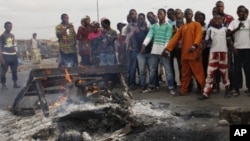United Nations investigators have found evidence that crimes against humanity may have been committed in Ivory Coast both by forces loyal to the West African country's ex-president Laurent Gbagbo and by forces loyal to his opponent and successor, Alassane Ouattara.
Three investigators were sent to Ivory Coast by the United Nations Human Rights Council in May. Their job was to probe alleged attacks against the population since the country’s presidential election last November.
What they found, the panel said Friday, was evidence of possible crimes against humanity having been committed on both sides of the political divide.
They said rape and murder were carried out through generalized and systematic attacks, targeting people based on their assumed political sympathies.
The investigator’s report is set to be discussed at the Human Rights Council next Wednesday and until then they have declined to speak with VOA about its findings.
But they’re not the first to say that forces loyal to Ivory Coast’s current leader, Alassane Ouattara, may have committed major crimes in recent months.
The international rights groups Human Rights Watch and Amnesty International have both accused Ouattara’s followers of targeting suspected supporters of former leader Laurent Gbagbo.
Deputy Director for Africa at Amnesty, Véronique Aubert, says that Ouattara must bring the situation under control. "He's the president and that's why we expect him to issue clear public instructions to security forces to comply with Ivorian law and international human rights law," she said.
On Thursday the U.N. mission in Ivory Coast accused Ouattara’s supporters of carrying out attacks in the south and west in areas where there is known support for Gbagbo.
The U.N. human rights officer in Ivory Coast, Guillaume Ngefa demanded an immediate and impartial investigation into the attacks.
When Ouattara was sworn in last month he vowed to end the violence in Ivory Coast and to investigate alleged atrocities.
Christian Kramer, research assistant for the LSE IDEAS Africa Program at the London School of Economics, says Ouattara is in a difficult situation because he came to power by relying on a number of armed gangs and rebel groups that he did not have control over.
"Now he has to wrestle the control back from these rebel forces because these groups, these armed gangs and to some extent mercenaries, are now coming back to him and saying 'we helped you into power and now we would like you to show some gratitude for that,'" said Kramer.
Kramer says now as president, Ouattara is responsible for the country’s security and must take charge.
And he says the U.N. report is part of an important process that may lead to reconciliation. "We're now actually looking at a country that is finding itself willing to make a new start. So the reports that are coming out of the big cities all over the country in Ivory Coast are saying people are back on the market, people are finding their way back into their lives. So it can even be argued that the UN report, as damning as it may seem at the first look, at the same time it's a major component and a very important component of bringing the country back into peace and restarting the social and economic and political life of the country," he added.
The U.N. investigators said Friday that they were unable to put a precise figure on the death toll since November’s disputed election. But they estimate that around 3,000 people have been killed.
UN Reports on Murder and Rape in Ivory Coast




